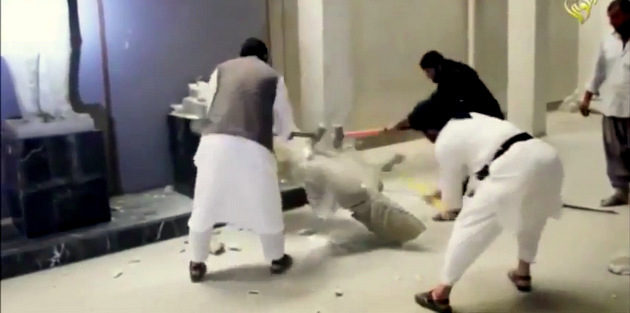ISIS Vindicates the Humanities
The biggest threat to the Islamic State: knowledge of a world without them by SARAH SKWIRE…
Lately the US has been engaged in one of its periodic arguments about whether the arts and humanities are really that important.
Meanwhile, in Mosul, Iraq, ISIS has been using sledgehammers and power drills to smash 3,000-year-old works of art, and setting off bombs in the public library, destroying 10,000 books and over 700 rare manuscripts.
Maybe we can stop arguing now?
The enemies of modernity and tolerance and civility and liberty, and all the other values that classical liberals hold dear, believe that destroying the products of the arts and humanities will further their goals. They think the statues they are smashing to splinters and the words they are burning are important and influential enough to warrant their destruction.
This is not, it is worth noting, a radical innovation by ISIS. There is a long history of fundamentalist Islamic groups destroying cultural treasures. The Buddhas of Bamiyan. The “end of the world” gate in the ancient city of Timbuktu. Over 95 percent of ancient Mecca. Countless thousands of ancient manuscripts. Groups from ISIS to the Taliban to Wahabist Saudi clerics have made it clear: everything must be obliterated.
They claim, of course, that these things must be destroyed because they are idolatrous in themselves or might inspire idolatrous thinking in others. But I think it is far more likely that ISIS wants them destroyed because these objects prove the falseness of their version of history.
From the 8th to the 14th centuries, the flourishing, trading, creative, scientific, philosophic, artistic, and intellectual marvel that was the Islamic Golden Age produced a ringing argument against the ISIS narrative that their way—the way of extremism and the sword—is the only path to success.
Golden Age science, mathematics, and medicine were the envy of the world. The tolerance and intellectual curiosity modeled by thinkers like Al-Kindi, Al-Farabi, and Ibn Rushd created a civilization where, more than anywhere else, Muslims, Jews, and Christians were able to study, trade, and live in unprecedented peace and productivity. And this Golden Age died when people who would have been very much at home in ISIS began to gain power.
For ISIS to continue to spread their evil, they must destroy the history that gives evidence against them—by destroying the museums and libraries that protect it—just as they must destroy the living humans who fight them.
Are the arts and humanities important? Do they accomplish anything we should care about?
Look at those who want to destroy them. Consider what their ends are. Then tell me.

ABOUT SARAH SKWIRE
Sarah Skwire is a fellow at Liberty Fund, Inc. She is a poet and author of the writing textbook Writing with a Thesis.


